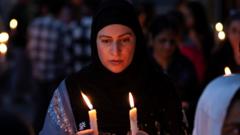The article text:
Shabir Ahmad Dar, a pashmina shawl seller from Indian-administered Kashmir, faces hardship not just in sales but in safety following a violent incident in Mussoorie, a hill town in Uttarakhand. For over two decades, Dar has showcased his intricately made shawls, a symbol of luxury and a piece of his identity. However, after the tragic killing of 26 people at a popular tourist spot in Kashmir, Dar and another salesman were confronted violently by Hindu right-wing activists who wrongly blamed them for the attack attributed to militants in Kashmir.
Filmed during the assault, the footage shows the attackers damaging their stall and threatening them with violence. “They told us to leave and never return,” Dar stated, highlighting the goods worth thousands left behind out of fear. Following public outrage, the police detained the attackers but quickly released them after a nominal fine, leaving many Kashmiris, including Dar, feeling insecure and prompting a swift return home.
The recent surge of violence is part of a broader pattern as Kashmiri students and vendors across major Indian cities face accusations and harassment. An incident in which a nursing student, Ummat Shabir, was labeled a “terrorist” also speaks to the urgent need for understanding and compassion. Women, in particular, are facing heightened suspicion and hostility, which has pushed many to evacuate their schools or workplaces back to what they perceive as the safety of their homes.
Moreover, an intense crackdown on Kashmiris is evident as security forces have ramped up operations. Thousands have been detained, and civil liberties continue to erode. This has led to fears of collective punishment in response to the militant attack, with critics emphasizing the need for discerning between civilians and militants. The emotional toll on Kashmiri communities is profound, with many individuals expressing feelings of being unjustly scapegoated.
Historically, violence between India and Pakistan has heightened suspicion against Kashmiris, often leading to retaliation from groups within India. As civil society pressures mounted, prominent figures have condemned attacks against civilians, including an emotional plea from the wife of a deceased naval officer, urging unity and peace rather than further division and violence.
Kashmiri author Mirza Waheed poignantly describes the plight of Kashmiris, noting that they face an added layer of vulnerability due to being perceived as representatives of India's Muslim population. This ongoing stigmatization, coupled with measures such as home demolitions by security forces against suspect families, exacerbates the pervasive climate of fear.
On the ground, the struggle for normalcy continues against the backdrop of political unrest, with civilians expressing disillusionment and a desire for justice. Dar's narrative illustrates the chaotic implications of violence—not just in losses of property, but in the very essence of identity and belonging that many Kashmiris are forced to grapple with in a now hostile environment.
Shabir Ahmad Dar, a pashmina shawl seller from Indian-administered Kashmir, faces hardship not just in sales but in safety following a violent incident in Mussoorie, a hill town in Uttarakhand. For over two decades, Dar has showcased his intricately made shawls, a symbol of luxury and a piece of his identity. However, after the tragic killing of 26 people at a popular tourist spot in Kashmir, Dar and another salesman were confronted violently by Hindu right-wing activists who wrongly blamed them for the attack attributed to militants in Kashmir.
Filmed during the assault, the footage shows the attackers damaging their stall and threatening them with violence. “They told us to leave and never return,” Dar stated, highlighting the goods worth thousands left behind out of fear. Following public outrage, the police detained the attackers but quickly released them after a nominal fine, leaving many Kashmiris, including Dar, feeling insecure and prompting a swift return home.
The recent surge of violence is part of a broader pattern as Kashmiri students and vendors across major Indian cities face accusations and harassment. An incident in which a nursing student, Ummat Shabir, was labeled a “terrorist” also speaks to the urgent need for understanding and compassion. Women, in particular, are facing heightened suspicion and hostility, which has pushed many to evacuate their schools or workplaces back to what they perceive as the safety of their homes.
Moreover, an intense crackdown on Kashmiris is evident as security forces have ramped up operations. Thousands have been detained, and civil liberties continue to erode. This has led to fears of collective punishment in response to the militant attack, with critics emphasizing the need for discerning between civilians and militants. The emotional toll on Kashmiri communities is profound, with many individuals expressing feelings of being unjustly scapegoated.
Historically, violence between India and Pakistan has heightened suspicion against Kashmiris, often leading to retaliation from groups within India. As civil society pressures mounted, prominent figures have condemned attacks against civilians, including an emotional plea from the wife of a deceased naval officer, urging unity and peace rather than further division and violence.
Kashmiri author Mirza Waheed poignantly describes the plight of Kashmiris, noting that they face an added layer of vulnerability due to being perceived as representatives of India's Muslim population. This ongoing stigmatization, coupled with measures such as home demolitions by security forces against suspect families, exacerbates the pervasive climate of fear.
On the ground, the struggle for normalcy continues against the backdrop of political unrest, with civilians expressing disillusionment and a desire for justice. Dar's narrative illustrates the chaotic implications of violence—not just in losses of property, but in the very essence of identity and belonging that many Kashmiris are forced to grapple with in a now hostile environment.




















